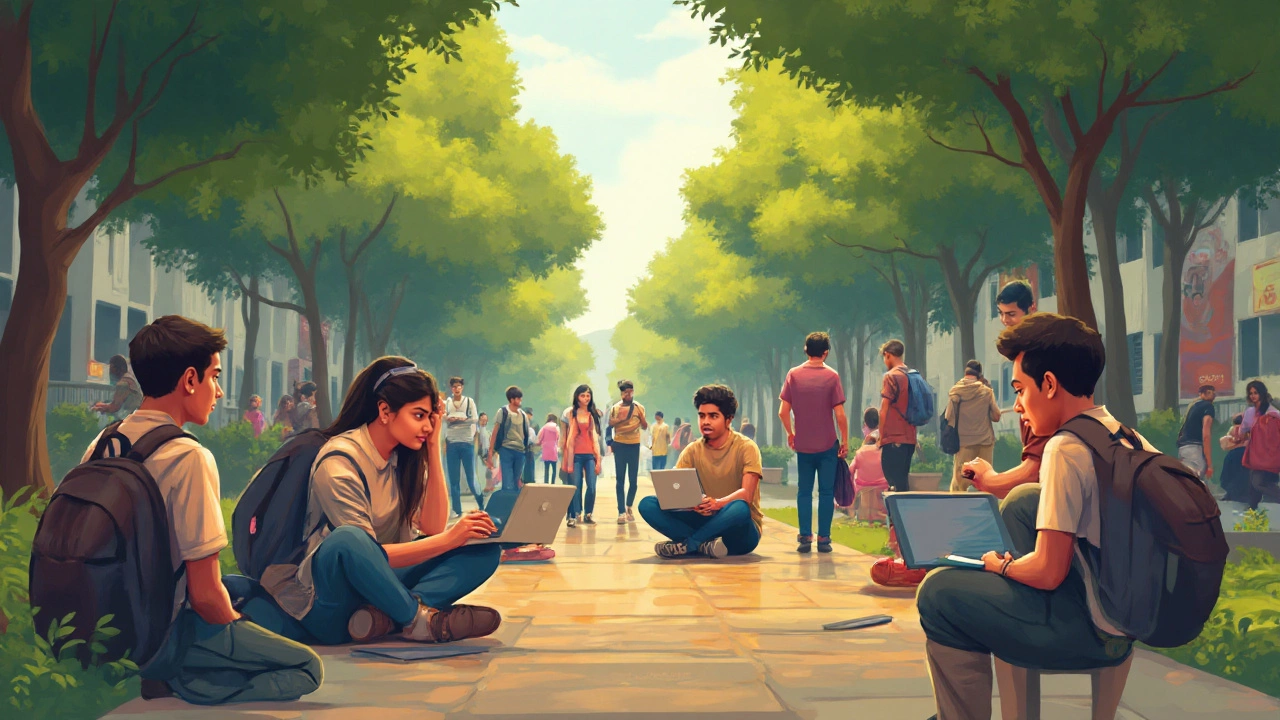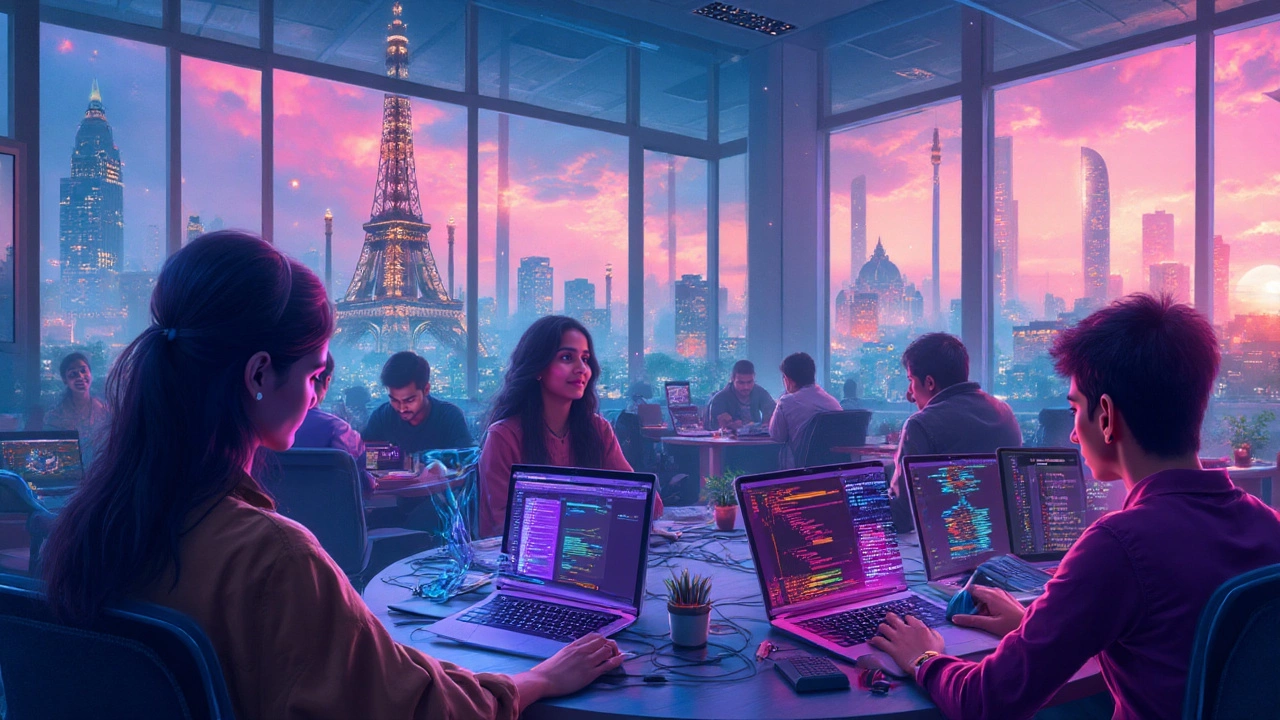The idea that robots are coming for every tech job just won’t die. Did you know a viral rumor in early 2024 claimed AI would replace half of all programmers by 2026? Here’s the thing: the world hasn’t gone dark with abandoned laptops and laid-off coders. In fact, tech recruiters in Bangalore, Berlin, and San Francisco still scramble to find the right coding talent. Middle schoolers still dream of launching the next viral game. Coffee shops are still full of folks debugging on faded stickers and hopes. And yeah, even my wife Mira can spot the difference between a frazzled coder and an AI pretending to code. So what’s really happening? Is coding still a ticket to a hot career, or are we just fooling ourselves?
Coding Jobs: The Reality Behind the Hype
Let’s toss out the magic and look at the hard numbers first. In the U.S. alone, the Bureau of Labor Statistics predicted a 25% jump in software developer jobs between 2022 and 2032. That’s way faster than most fields, with nearly half a million new positions on the horizon. India’s IT sector added nearly 200,000 net tech jobs in 2024, according to NASSCOM. Even with all the buzz, entry-level coding roles keep appearing on job boards. Why? The digital world keeps expanding. Think about the explosion of fintech startups, custom AI tools, logistics apps, and plain old business automation. Without coders, none of these work.
But here’s where things get interesting. The jobs themselves are changing. If you were counting on a career doing repetitive, boilerplate code, well, yeah, AI might do that faster and cheaper. But demand is shifting to coders who can build, integrate, and adapt—people who understand not just syntax in Python or JavaScript, but how to solve business problems, secure data, and work on a team. We’re not in the age of “code monkeys” anymore. Recruiters now value flexibility: you might build web apps one day and wrangle cloud APIs the next. Coding isn’t just a technical activity. It’s a creative process, full of debugging, prototyping, and collaborating. That’s something chatbots are still bad at.
Now zoom out. Every sector, from health care to agriculture, needs custom software. In 2025, hospitals use massive codebases to handle patient data, drones need stable code for navigation, and smart refrigerators need regular code updates. Companies like Google and Apple are still hiring coders by the thousands—but so are banks, logistics firms, NGOs, and even city governments. A 2023 Stack Overflow survey found that 85% of coders worked outside the classic software company environment. So if you can code, the options are wider than ever, even if some job titles have shifted since the iPhone first launched.
Why Coding Skills Reshape Your Career—even if You’re Not a Full-time Dev
Here’s a secret: most people who use coding at work aren’t called “software engineers.” Maybe you’re in marketing, data science, business operations, or even journalism. Just knowing how to automate reports with Python or scrape the web for research projects can put you ahead of your coworkers. Tiny scripts save hours. Custom business dashboards built in React or SQL turn ordinary employees into office heroes. At my previous gig, one colleague automated boring monthly workflows in two weeks—all because he watched some YouTube coding tutorials. His manager thought he was a wizard; he just knew how to Google for code snippets.
It gets better. Coding is like learning a universal language. When you understand how APIs work, or how to loop through a spreadsheet with a script, suddenly whole new types of work open up. A Deloitte report in 2024 said almost 65% of businesses now view coding as a “critical capability,” even for people in non-tech teams. Hospitals train nurses to use R for patient outcomes. Airlines hire “citizen developers” to automate ticketing workflows. The World Economic Forum even included programming in its top 10 skills for the future workforce (right alongside negotiation and emotional intelligence—yes, really).
And don’t forget: remote tech jobs exploded after 2020. Living far from a major city is no barrier anymore. Mira’s cousin, a coder in Udaipur, works on a cryptocurrency wallet with a Berlin-based startup, all from his living room. Glassdoor’s 2025 data showed over 35% of software development ads mention remote-first work, and the numbers keep climbing. That kind of flexibility is hard to find in many other careers—and makes coding super appealing for those who value balance, family time, and freedom.

But Isn’t AI Writing Code Now? What Human Coders Still Bring
Here’s where things get spicy. ChatGPT, Copilot, TabNine, Gemini—automated code tools are everywhere. Some folks even joke, "Why hire a coder when you can prompt your laptop?" But anyone who’s tried to build something real knows how far these tools still have to go. AI code helpers can suggest functions, finish loops, and write basic tests. They’re great for cranking out boring, repeatable chunks. But when it comes to understanding messy requirements, dealing with unreliable APIs, or just debugging why a server goes kaboom at 2 AM—real coders still have the edge.
Plus, code is rarely perfect on the first try. Even the best AI stumbles. Human coders can ask the right questions, sift through documentation, or just know when something “smells off.” Creativity matters, too. A 2024 GitHub report found software engineers spend more than half their time making architectural decisions, planning features, and collaborating—not just punching out code. When my team built an internal dashboard last fall, the hardest parts weren’t the code—they were figuring out what users wanted, how to make it friendly, and explaining bugs in plain English.
Here’s another angle: security. Bad code can lead to real-world disasters—think data leaks, crashed e-commerce shops, or even hacked cars. Human oversight is critical. That’s why many big tech companies require code reviews by two or more humans before anything goes live, even if an AI wrote the first draft. Even after two years of AI code tools, Google, Amazon, and the Indian government are still pouring money into recruiting and training human developers to keep software safe, trustworthy, and up-to-date.
The bottom line? AI is a fantastic coding assistant. It makes experienced developers faster and gives beginners odd moments of superhero powers. But it’s not about to replace the need for actual thinking, empathy, or hands-on problem-solving that humans bring. Instead, coders who learn how to leverage AI will see their careers take off—while those who ignore it may struggle to keep up.
How to Stay Relevant as a Coder (or Learn It Fast in 2025)
If you’re already working in tech, keeping your skills fresh is less about learning the hottest language and more about building versatility. The most valuable developers now are curious and relentless problem-solvers. They love learning, dig deep into documentation, and experiment with new frameworks before everyone else jumps in. Languages and tools will change (just ask anyone who survived the shift from PHP to Node.js, or from on-prem to cloud), but the ability to pick up new stuff quickly is what makes a coder future-proof.
So what skills should you really focus on? Here’s what’s showing up again and again in job ads and career surveys:
- Strong understanding of algorithms and data structures—something AI-powered tools can’t always improvise.
- Experience with cloud platforms like AWS, Azure, or GCP—since most companies are ditching their own servers.
- Knowledge of secure coding practices—because hacks cost real money and trust.
- Teamwork and communication—because complex software is always a group project.
- Comfort with AI-powered tools—knowing how (and when) to use Copilot, ChatGPT, or Gemini can make your workflow fast and efficient.
If you’re curious about coding but haven’t started yet, don’t get intimidated by the myths. Learning the basics—Python, HTML/CSS, or SQL—doesn’t take a computer science degree. There are countless free and affordable resources. Sites like freeCodeCamp, Codecademy, and LeetCode offer structured lessons. YouTube channels like "Tech with Tim" break down beginner projects with humor anyone can understand. Start with a simple project: build a to-do list app, scrape your favorite news site, or automate a boring chore. You’ll be surprised how quickly little victories add up.
Want an extra edge? Connect with others. Join local or online coding meetups, hackathons, or open-source communities. When I learned Rust last year, the real gold wasn’t just the language—it was bouncing ideas off other learners. Sharing wins (and bugs) makes you feel less stuck and helps you build the network that’ll open doors down the line. As tech careers get broader, coding is as much about people as it is about screens and syntax.
So are coders still in demand in 2025? The answer’s a loud yes—coders in demand is more than just a catchphrase, it’s backed by real-world job offers, industry shifts, and everyday success stories. Whether you want to launch the next unicorn startup, climb the corporate ladder, or just solve your own problems, coding is still a skill worth betting on. The only thing changing faster than tech is the set of adventures waiting for those who can speak its language.
